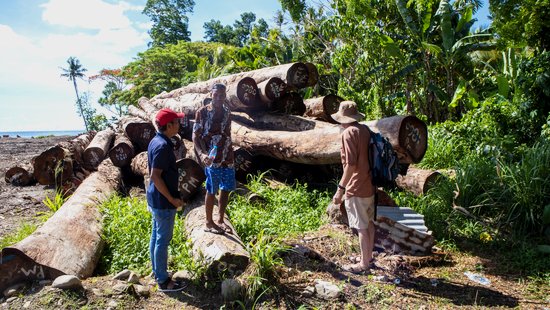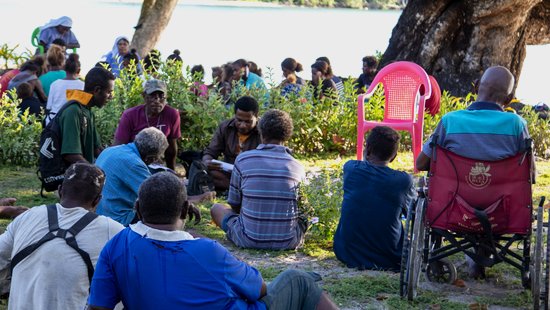In the Solomon Islands, industrial logging has upset all aspects of life for communities near or downstream of the harvesting sites: rivers are polluted, new invasive species destroy livelihoods, and women and young girls have fallen victim to domestic trafficking. In October, Franciscans International and the Dominicans for Justice and Peace travelled to several of the affected communities together with local sisters and brothers. Here, we joined forces to thoroughly document the adverse impacts of logging and determine the next steps we can take in terms of advocacy and awareness-raising.
“Our mission has been defined in terms of people going into schools and parishes, prisons, visiting people in villages, helping them, praying with them, and running mission programs,” says Brother Christopher John SSF. As the Minister General of the Anglican Society of Saint Francis, he first approached Franciscans International with a request to raise the harm caused by logging in the Solomon Islands at the United Nations.
“I suggested to the brothers, as they celebrated their 50th anniversary in the Solomon Islands, that we needed to expand our idea of mission to take in all of creation – that our care for creation is also part of our mission work ,” says brother Christopher. Following his request, FI, the Dominicans for Justice and Peace and local brothers and sisters worked hard to bring together their information and alert the international community about these problems in a report ahead of the Solomon Island’s 2021 Universal Periodic Review.

The recent mission deepened our understanding of the issues at stake for affected communities and ensured that we have the necessary information to continue to build pressure both at the national level and at the United Nations.
Fact-finding at the grassroots
The core of the mission consisted of a series of focus group discussions that were conducted by local Anglican and Catholic sisters and brothers in six villages across Guadalcanal Island. To ensure that people could freely discus how they were affected, the conversations took place in different groups, including traditional leaders, women, and youth. Everywhere, we encountered stories of lives and livelihoods that have been upset by logging, while promises of development and replanting the forests were not kept.
“Before, if you planted food, you would enjoy it growing: the wild pigs would not come down from the forest and eat it. The fish in the river, before you could dive and take them: now you can’t take anything from the rivers. Even the [vines] that we use to tie up our leaf houses: there are none in the bush because the machines destroyed them,” said one village elder and brother of the Third Order of the Society of Saint Francis. “So that’s the difference before and now – before we enjoyed everything in the bush. Now, no.”

These focus group discussions were complemented by sessions with local sisters and brothers on how to engage domestic and international human rights mechanisms. Afterwards, they also met with civil society representatives, lawyers, journalists, diplomats, and UN representatives. These conversations helped to further identify the legal and practical barriers to either prevent further logging or compel the logging companies to make good on the promises given to communities – such as the development of infrastructure, schools, sanitation facilities and medical clinics.
A deep-rooted and long-term engagement
While FI will use the findings it gathered for a subsequent submission to the UN, the sisters and brothers in the Solomon Islands are also incorporating the lessons from the workshop into their own ministry, including through plans for further awareness raising and community engagement, such as theater and performances.

“In the villages we visited, the brothers are from up and down the road and they’re well known. We are not people who have just dropped in to do something and fly away,” says brother Christopher. “For us working on these issues is not just a one-off thing – where you come in, there’s a solution, and you can go away and tick a box. It’s a long-term relationship.”

